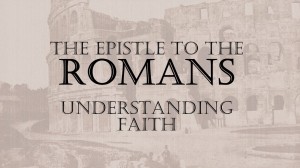 Romans 7 in my view is more or less the idea that we are not under the law and the struggle there would be that of someone attempting to keep the law by asserting our sinful human nature (flesh). Take a pencil and mark all the uses of “I” and you’ll see what I mean.
Romans 7 in my view is more or less the idea that we are not under the law and the struggle there would be that of someone attempting to keep the law by asserting our sinful human nature (flesh). Take a pencil and mark all the uses of “I” and you’ll see what I mean.
Romans 8 turns the page to the ministry of the Holy Spirit. Mark the uses of the word Spirit to see the difference.
Now then Romans 8:26 – 30 seems to start with the idea that “The Spirit helps us in our weakness.” and then discusses three points.
- Prayer v. 26-27 – “…the Spirit himself intercedes for us…”
- Providence v. 28 – :… all things work together for good…”
- Predestination v. 29-30 “…those whom he foreknew he predestined…”
The connection to the Holy spirit and Prayer is clear in the text and intuitively. Prayer generally takes the shape of appealing to the Father in the name of the Son. the Spirit enables, and so some extend prays for us.
Providence in verse 28 is God’s care over all the parts of our lives so that for the believer they come to a good purpose. We generally think of this is a God the Father issue – Isn’t the Father the one who decrees and orders things? So then what role does the Spirit have in this? This is a new perspective for me on this question. I have a few thoughts
- The Spirit enables our response to hardship to be beneficial. hardship can just as easily lead to anger or bitterness. However, the internal work of the Spirit can be seen to work transformation in us, so we gain perseverance, empathy, hope and other virtues. (See Romans 5; James 1 and 2 Corinthians 1).
- The external ordering of things seems to be the Fatherly part. The internal transformation of us seems to be the Spirit’s part.
Election and Predestination again seem to be the work of the Father, who decrees all things. Yet can see a role of the Holy Spirit in this. I learned the difference between “eternal security” and “Perseverance of the saints” some time ago. I had tought of them as the same. However, the first idea seems to be that God says “what is saved will be saved.” The second has the idea that God acts in us to cause us to persevere. His care goes with his decree. Now some thoughts of the Holy Spirit in this.
- The Spirit walks us through foreknowledge, when we remember that to “know” in the Bible us usually a personal thing not just intellectual. The Spirit knows us deeply (V. 27).
- Predestination in the text is tied to “being conformed to the likeness of his Son”. This is a transformation, and are we not accustomed to see that the process of sanctification is spiritual?
- Predestination is also linked to Christ “being the firstborn among many brothers.” This is the new birth (our part of it). John 3 has Jesus telling Nicodemus that he must be born of the Spirit.
- Calling of course reminds us of the decree of the Father, but how is the call accomplished? Does not the Spirit of God draw, convince and convict us?
- Justification is a legal status, where the work of Christ is applied to the believer. How is that applied? I think of the classic theology text, “Redemption Accomplished and Applied” by John Murray. Is it not the work of Christ to accomplish redemption. He said, “it is finished.” Yet is it not the work of the Spirit to attach that work to us?
- Glorification is the final transformation to perfection. Then the struggle of Romans 7 is forever gone, as are the struggles of Romans 8 (which meet with more success.) when we are transformed. I Corinthians 15 speaks of being raised to a Spiritual Body.
These are just rumination at this point. The main insight ist hat we can look at these words from the standpoint of the Father and his decrees, the Son and his finished work and the Spirit who lives in us and attaches Christs work to us.
As the Church Fathers (and probably some Mothers) said, “All the works of God are undivided.” This means that in creation and is redemption the Father, Son and Spirit work as one.